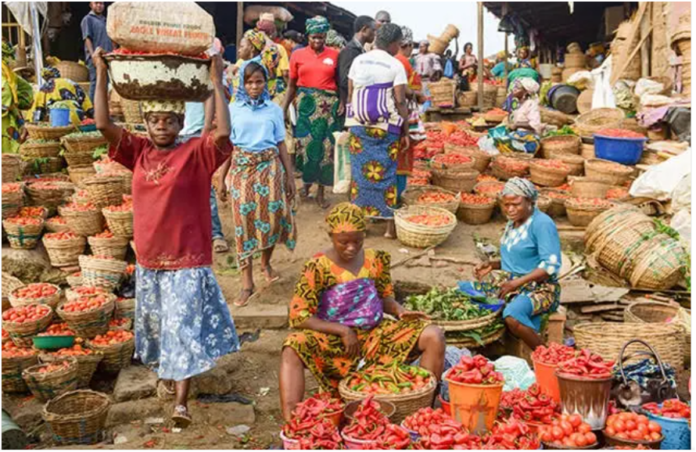Inflation at nearly 27% deprives Nigerians of healthy living
By Jeph Ajobaju, Chief Copy Editor
Inflation rose to 26.72 per cent in September, an 18-year high that has again drawn criticism from opposition parties, industry stakeholders, and ordinary citizens facing the brunt of high costs across all sectors that deprive them of decent living.
In the North, the food basket of Nigeria, agricultural produce is surplus in some states, including Taraba, but there is no money to buy food, and the high cost of transportation makes it hard for farmers to convey it to the South, particularly to Lagos the most consumer of food among states.
The National Bureau of Statistics (NBS) Consumer Price Index (CPI) report for September released on Monday shows headline inflation rate increased 26.72 per cent year-on-year (YoY) in September, or 920 basis points against 25.8 per cent in August.
It said the food index increased to 30.64 per cent from 29.34 per cent in August.
“In September 2023, the headline inflation rate increased to 26.72 percent relative to the August 2023 headline inflation rate, which was 25.8 percent,” the NBS added.
“Looking at the movement, the September 2023 headline inflation rate showed an increase of 0.92 percentage points when compared to the August 2023 headline inflation rate.
“On a YoY basis, the headline inflation rate was 5.94 percent points higher compared to the rate recorded in September 2022, which was 20.77 percent.
“This shows that the headline inflation rate (YoY basis) increased in September 2023 when compared to the same month in the preceding year (i.e., September 2022).”
Inflation rate slowed 1.08 percentage points month-on-month (MoM) to 2.1 percent in September from 3.18 per cent in August, according to the NBS.
“This means that in September 2023, the rate of increase in the average price level was less than the rate of increase in the average price level in August 2023.
“The Food inflation rate in September 2023 was 30.64 percent on a YoY basis, which was 7.3 percentage points higher compared to the rate recorded in September 2022 (23.34 percent).
“The rise in food inflation on a year-on-year basis was caused by increases in prices of Oil and fat, bread and cereals, potatoes, yam and other tubers, fish, fruit, meat, vegetables and milk, cheese, and eggs.”
The Peoples Democratic Party (PDP) said the inflation report shows President Bola Tinubu and his All Progressives Congress (APC) did not prepare for governance, and the Labour Party (LP) described it as the verdict on the new administration.
__________________________________________________________________
Related articles:
Manufacturers express concern over N470b unsold goods
High inflation decreases household consumption 4%
Inflation jumps to 22.22%, Buhari denies responsibility for it
__________________________________________________________________
Nigerians pushed further down into poverty
APC National Publicity Secretary Felix Morka declined comment saying, “I don’t have any information on that for now.”
But other individuals and organisations who expressed their views include LP presidential candidate Peter Obi, Cardinalstone Research, Association of Capital Market Academics of Nigeria (ACMAN), and Centre for the Promotion of Private Enterprise (CPPE), per reporting by Vanguard.
Debo Ologunagba (PDP National Publicity Secretary)
“We are not in the least surprised about the report. It is not particularly news that the prices of food and other items have pushed inflation to 26.72 per cent, it also confirms what we have always told Nigerians about this government.
“When inflation climbed to double digits after the APC took power in 2015, we told Nigerians it can only get worse because the APC can’t give what it does not have.
“Like the Muhammadu Buhari administration before it, this administration has pushed more Nigerians further down into poverty. The number of Nigerians living in extreme poverty which stood at over 133 million, representing roughly 64 per cent of Nigerians during the Buhari regime, has risen under Tinubu.
“Nigerians are invited to note that when the PDP was in power, the economy was better managed, inflation was within single digits, the exchange rate of the naira to the dollar was around N180 to $1 USD, but today the naira is the worst performing currency in the world exchanging at over N1,000 to $1USD.
“A 50kg bag of rice under successive PDP governments sold for no more N8,000 per bag but now you’ll struggle to get the same bag for N50,000 at a time the national minimum wage is just N30,000 per month.
“This is the legacy the APC is leaving behind. We urge Nigerians not to despair, help is coming. We are confident that the Supreme Court, which is the last hope of the common man, will do justice and return our stolen mandate for our dear nation to return to the path of growth and prosperity.”
Obiora Ifoh (LP National Publicity Secretary)
“The NBS report pegging the national inflation rate of food prices and other items at 26.72 per cent is simply a reflection of how badly the Tinubu administration has failed since taking over albeit temporarily on May 29, 2023.
“The truth is, you can’t give what you don’t have. He has recruited more image-makers than people who can properly manage the economy. What we have is a trial and error administration.”
Peter Obi on X (Twitter)
“A vast majority of Nigerians spend the entirety of their disposable income on food, which is often hardly enough.
“As the global community marks World Food Day today, we must remind ourselves of the present food crisis in the nation, and seek urgent steps to salvage the people from further hunger and starvation.
“Food crisis has remained a serious challenge facing many households in Nigeria, as the country is reported, by Global Hunger Index, to be facing a serious hunger level.
“With more than half of the population living in poverty, a report by the Food and Agriculture Organisation of the United Nations (FAO) has shown that over 90 million Nigerians face food insecurity, thus posing obstacles to a healthy population and human development.
“In the 2023 Global Hunger Index, Nigeria ranked 109th out of the 125 countries measured, showing that we currently battle high levels of hunger.
“Reports have it that Nigeria’s food inflation rate in August 2023 was about 30 percent on a year-on-year basis.”
“The horrible spate of attacks on farmers in Nigeria by armed and terror groups have continued to hinder food production, food supplies and therefore, threatening to push the country deeper into a devastating hunger crisis. Lack of adequate investment in agriculture also contributes greatly to food crisis in Nigeria.
“I have maintained that the vast fertile lands in the North, if put into productive agricultural use, will produce enough food for domestic consumption and for exports, which can give us more revenue than we generate from oil.
“Government, therefore, must invest heavily in agriculture, to ensure sufficient food production for Nigeria and the global world. Happy World Food Day.”
Analysts at Cardinalstone Research
“There appears to be no respite for consumer prices with headline inflation scaling by 91 basis points to 26.7 percent in September 2023 and sustaining its 18-year high.
“We link the uptick to the spillover effect of currency pressure and the notable jumps in AGO [diesel] and cooking gas prices, leading to a 69 basis points increase in housing, water, electricity, gas and other fuel, HWEGF.
“Consequently, core inflation rose to a new 2-decade-high of 22.1 percent. Unsurprisingly, food prices also increased by 1.28 percentage points to 30.7 percent with the Famine Early Warning Systems Network, FEWS NET, highlighting the compounding impacts of conflict and increasing incidences of abductions in the North-West and North-Central regions of the country.
“In a surprising twist, MoM inflation rose by 2.5 percent in September, compared to the 3.8 percent reading in the prior month.
“The moderation partly reflects the commencement of some green harvest – sorghums, millet, corn, etc, mostly in the southern part of the country.
“While we understand that the harvesting may be more pronounced in October, which could taper price pressures, we are not convinced that price declines are in the offing.
“For context, we note that headwinds to crop production in the north are still prevalent, stemming from low rainfall, sustained conflicts and lack of financial access to inputs in food-producing states.
“Furthermore, the risk of higher PMS prices is still very likely, with crude oil prices steadied above $90.0/bbl due to the Israel-Hamas conflict.
“Although the recent action of the Central Bank of Nigeria, CBN to lift the FX ban on 43 items is directed at reducing parallel market pressure, the positive impact on prices is unlikely in the short term until the CBN intensifies supply. Overall, we expect inflation to average 25 percent in 2023.”
Lukman Otunuga (TXTM Senior Research Analyst)
“Inflation remains piping hot in Africa’s largest economy while interest rates are currently at their highest levels since the monetary policy rate was adopted in 2006.
“It is worth keeping in mind that the inflation menace continues to draw strength from the removal of fuel subsidies, devaluation of the official Naira and security issues in food production regions.
“Given how inflation is projected to jump in September to 27.1 percent, the CBN is likely to raise interest rates at its policy meeting this week for the fifth consecutive time.
“This vicious cycle of rising inflation and interest rates certainly presents a risk to Nigeria’s fragile economy. The question is whether the central bank will move ahead with a 25bp hike or opt for a larger move to tame inflation.”
Uche Uwaleke, a professor (ACMAN President)
“This pressure is felt more in the urban than in rural areas possibly on account of high transport costs.
“The trend in the inflation rate is quite worrisome given its impact on the purchasing power of the naira and by extension on the poverty level. It is equally partly to blame for the increasing dollarisation of the Nigerian economy and the demand pressure in the forex [foreign exchange] market.
“In view of the supply-side factors driving inflation in Nigeria, including rising cost of transport, energy, flooding and insecurity, the government must play complementary roles to that of the CBN [Central Bank of Nigeria] by tackling insecurity, massive investments in power and agriculture in partnership with the private sector as well as ensuring the speedy resuscitation of the refineries in order to bring down the cost of transport as well as help naira appreciation in the forex market when an end is put to import of petroleum products.”
Muda Yusuf (CPPE Director/Chief Executive Officer)
“Tkey inflation drivers are not receding, if anything, they have become even more intense.
“These factors include the depreciating exchange rate, surging transportation costs, logistics challenges, forex market illiquidity, astronomical hike in diesel cost, climate change, insecurity in farming communities and structural bottlenecks to production. These are largely supply side issues.
“Elevated inflationary pressures also aggravate pressure on production costs, weaken profitability, erode shareholders value and dampen investors’ confidence.
“Not many producers or service providers can transfer cost increases to their consumers. The implication is that manufacturers and other investors are taking a big hit. Products with high demand elasticity are more vulnerable.
“The government could tweak the tariff policies by granting concessionary import duty on intermediate products for industrialists. The same is true of investors in the logistics sector.”














